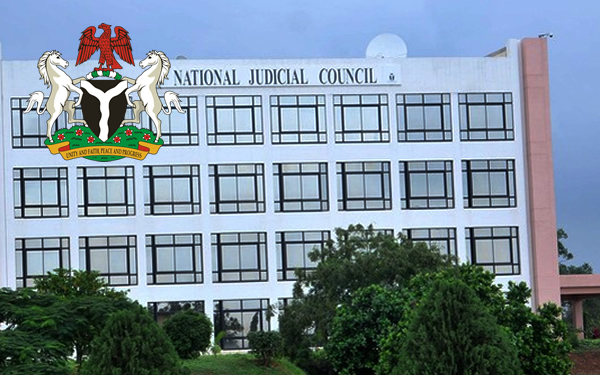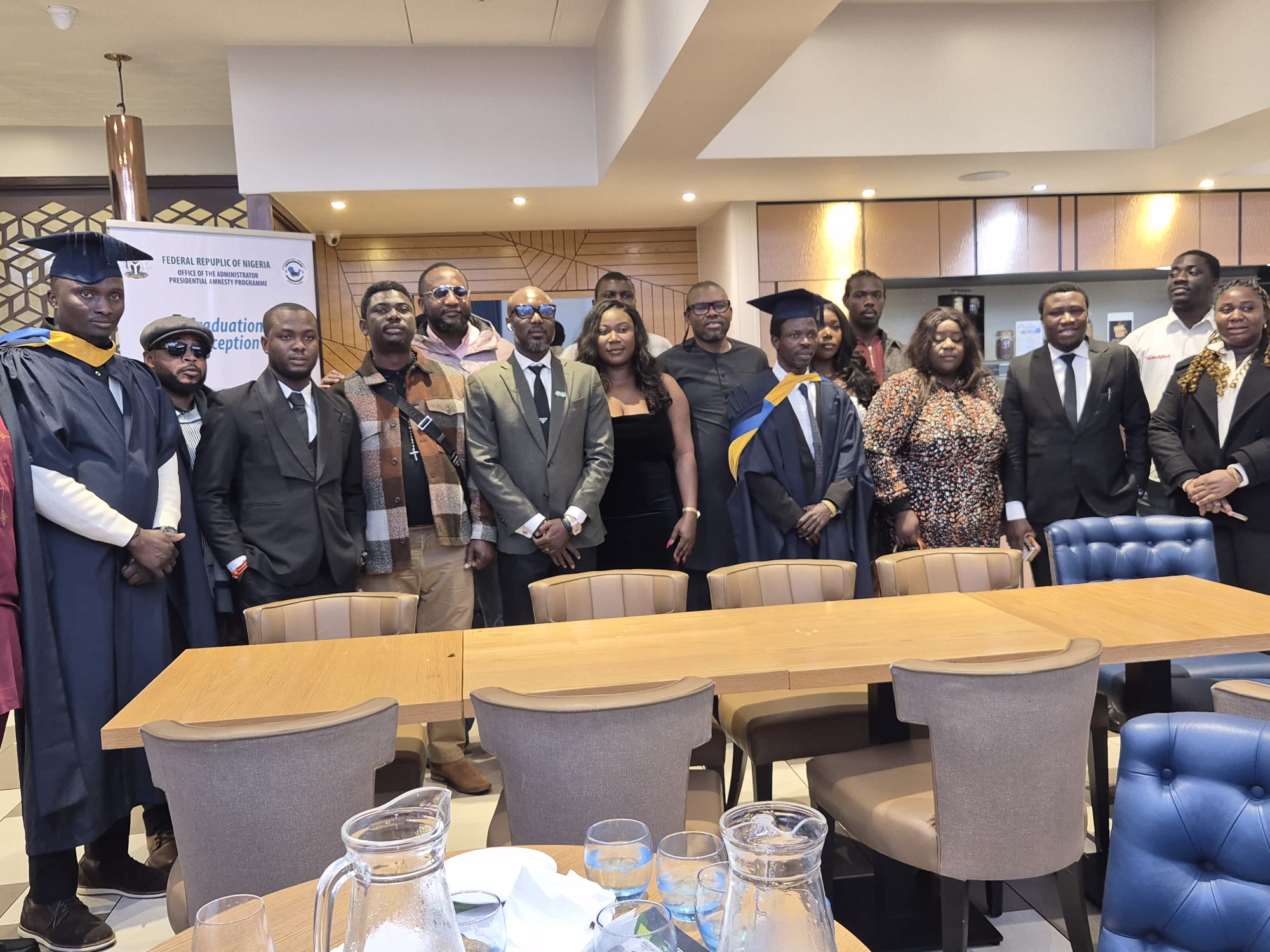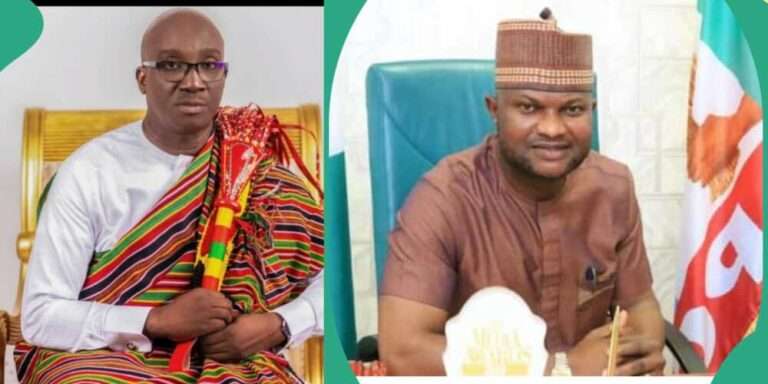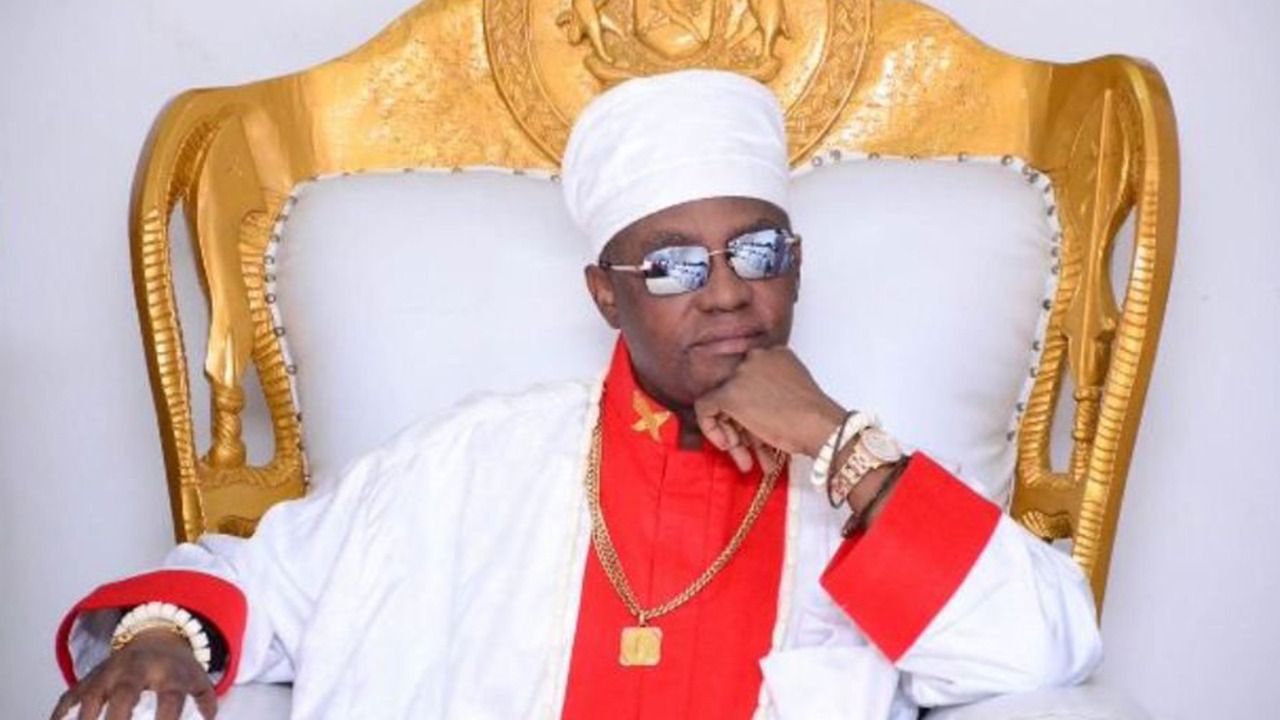News
Judicial Misconduct: NJC Sets Up Panel To Probe 35 Petitions Against

The National Judicial Council, NJC, on Friday, said it has constituted panels to investigate eight judges for alleged judicial misconduct.
The Council, in a statement it made available to newsmen, said its Preliminary Complaints Assessment Committees filtered 35 petitions that were written against the judicial officers and them to be meritorious.
However, the legal body stressed that other petitions that were brought against 20 High Court judges across the federation, were dismissed for lack of merit, evidence of misconduct, subjudice or that they were matters that could be appealed.
It further disclosed that stern warnings were issued to Justice Inyang Ekwo of the Federal High Court in Abuja for abuse of discretionary power of a Judge by wrongly granting an ex parte order, as well as to Justice G. B. Brikins-Okolosi of the Delta State High Court for his failure to deliver judgement within stipulated period.Whereas Justice Ekwo was barred from getting promotion to the appellate court for a period of two years, Justice .
Brikins-Okolosi was barred for three years.Besides, the NJC, which took the decisions at
its 105th plenary meeting held on May 15 and 16, okayed the elevation of 22 judges to the Court of Appeal.
READ ALSO: B-I-Z-A-R-R-E! Man Missing For 26 Years Found Alive In Neighbour’s House
Among those that made the list of judges to be promoted to the bench of the appellate court, included the wife of the former Governor of Rivers State and Minister of the Federal Capital Territory, FCT, Abuja, Hon. Justice Nyesom-Wike Eberechi Suzzette.
According to the Council, 64 others were recommended for appointment as judges of various other lower courts.
It said the recommended candidates were expected to be sworn-in after the approval of their appointment by President Bola Tinubu and Governors of their respective states.
Likewise, the Council said it deliberated on the notification of retirements of three Judicial Officers, among whom included the Chief Justice of Nigeria, CJN, Justice Olukayode Ariwoola, as well as the notification of death of three Judges of the Federal and State Courts. The statement, which was signed by the Director of Information at the NJC,
Soji Oye, read: “The National Judicial Council under the Chairmanship of Hon. Justice Olukayode Ariwoola, GCON, at its plenary of 105th Meeting held on 15 & 16 May 2024, resolved to issue warning letters to Hon Justice Inyang E. Ekwo of the Federal High Court and Hon. Justice G. B. Brikins-Okolosi of Delta State High Court.
“Hon Justice Inyang E. Ekwo is warned for abuse of discretionary power of a Judge by wrongly granting an ex parte order in Suit No FHC/ABJ/C/626/2023 Juliet Ebere Nwadi Gbaka & 2 Ors V Seplat Energy Plc & 12 Ors.
“The Hon Judge is also barred from being elevated to a higher Bench for a period of two years.
“Hon. Justice G. B. Brikins-Okolosi of Delta State High Court is also issued a warning for failure to deliver judgement within stipulated period in Joseph Anene Okafor Vs Skye Bank, Suit No A/94/2010 after parties had filed and adopted their final Written Addresses.
READ ALSO: How Australian Doctor Treated Own Brain Cancer With Personal Research Studies
“Justice G. B. Brikins-Okolosi will also not be elevated to a higher Bench for a period of three years.
“Council cautioned Hon. Justice Amina Shehu of Yobe State High Court for issuing Writ of Possession Conferring Title on the Defendant in Suit No YBS/HC/NNR/1cv/2020 when there was no subsisting judgement of any Court to enable His Lordship issue the Writ.
“Council at the meeting considered two Reports of its two Preliminary Complaints Assessment Committees that filtered 35 petitions written against Judges of the Federal and State High Courts and decided to empanel eight Committees to further investigate the petitions that were found meritorious by the Committees.
“Petition against various Judges were dismissed for lack of merit, evidence of misconduct, subjudice or that they were matters that could be appealed.
“The dismissed petitions were against Hon Justices A. M. Liman, A. A. Okeke, D. E. Osiagor of the Federal High Court, Hon Justices S. B. Belgore, Bello Kawu both of the High Court of Federal Capital Territory, Hon Justices O. A. Chijioke, A. E. Akeredolu and Kadi M. U. El-Mainari who sat on Election Petition Tribunal in Edo State, Hon Justice Okey Paulinus Aneke, High Court Enugu State and Hon Justice C. Anya of Abia State.
“Others are Hon Justices M. A. Ikpambese and W. I. Kpochi both of Benue High Court, Hon Justices T. E. Chukwuemeka Chikeka Chief Judge and B. C. Iheka of Imo State High Court, Hon Justice Rose Godwin Soji of Nasarawa State High Court, Hon Justice T. J. Yakubu, High Court Taraba State, High Justices W. N. Danagogo and Chinwendu Nworgu, High Court Rivers State, Hon Justice C. C. Okaa, High Court Anambra State and Hon Justice Abdullahi Sulyman High Court, Kogi State.
READ ALSO: FULL LIST: NJC Recommends 86 Judicial Officers For Federal, State Courts
“The Council deliberated on the notification of retirements of three Judicial Officers including that of the Chief Justice of Nigeria Hon Justice Olukayode Ariwoola, GCON and notification of death of three Judges of the Federal and State Courts.
“Council at the Meeting also considered the recommendation of its Interview Committee on Appointment of Judicial Officers of all Superior Courts of Record in Nigeria and resolved to recommend the under-listed 86 Judicial Officers for appointment to the Court of Appeal, High Court of the Federal Capital Territory, Sharia Courts of Appeal and Customary Courts of Appeal of States in Nigeria.”
They are as follows: “Twenty-Two (22) Justices, Court of Appeal: Hon. Justice Kwahar Polycarp Terna, Hon. Justice Ruqayat Oremei Ayoola, Hon. Justice Eleojo Eneche, Hon. Justice Asma’u Akanbi-Yusuf, Hon. Justice Abdullahi Muhammad Liman, Hon. Justice Abdu Dogo, Hon. Justice Fadawu Umaru, Hon. Justice Ishaq Mohammed Sani, Hon. Justice Zainab Bage Abubakar, Hon. Justice Abdulazeez M. Anka, Hon. Justice Nnamdi Okwy Dimgba, Hon. Justice Nwoye Victoria Tochukwu, Hon. Justice Nwabunkeonye Onwosi, Hon. Justice Okorowo Donatus Uwaezuoke.
“Hon. Justice Ngozika Uwazurunonye Okaisabor, Hon. Justice Ntong Festus Ntong, Hon. Justice Nehizena Idemudia Afolabi, Hon. Justice Nyesom-Wike Eberechi Suzzette, 19. Hon. Justice Lateef Babajide Lawal-Akapo, Hon. Justice Akinyemi Abiodun Azeem, Hon. Justice Oyewumi Oyejoju Oyebiola and Hon. Justice Olukayode Adegbola Adeniyi.
“Twelve (12) Judges, High Court, FCT, Abuja: Ademuyiwa Olakunle Oyeyipo, Bamodu Odunayo Olutomi, Anumaenwe Godwin Iheabunike, Odo Celestine Obinna, Hauwa Lawal Gummi, Abdurahman Usman, Buetnaan Mandy Bassi, Sarah Benjamin Inesu Avoh, Maryan Iye Yusuf, Ariwoola Oluwakemi Victoria, Lesley Nkesi Belema Wike and Munirat Ibrahim Tanko.
“Seven (7) Judges, Imo State High Court: Akowundu Cletus Ndubuisi, Uchenna Mary Njoku, Chibuogwu Ojiugo Chukwumaeze, Ononogbo Chidi Linus, Adaego Peace Nosiri, Emeka Ozoma Orafu, Mathew Chinedu Ijezie.
“Six (6) Judges, Bauchi State High Court: Amin Umar Ilelah, Aliyu Bin Idris, Ahmed Shuaibu Ningi, Shafa’u Ladan Yusuf, Abdussalam Idris Waziri, Kawu A. Yerima.
“Three (3) Judges, Taraba State High Court: Hamidu Audu, Bibonga Jeniffer Nauma, Joel Daniel Ubandoma.
“Thirteen Judges, Lagos State High Court: Sunmonu Tunde Bashiru, Azeez Fimisola Augusta, Alebiosu Olawale Lawal, Adewale Russel Musiliu, Popoola Oluwatosin Ajose, Anjorin-Ajose Tanimola Abdulwaheed, Muyideen Abdul-Raheem Tejumade, George Alfred Akingbola, Balogun Adegboyega Ganiu, Shonubi Adenike Kudirat, Badejo-Okusanya Yewande Jokotola, Layinka Oyeladun Amope, Ojuromi Nalirat Olayinka Oluwatosin.
“Four (4) Judges, Kogi State High Court: Ajesola Joseph Sunday, Ojoma Rachael Haruna, Kadiri Badama, Ezema Beatrice Ada.
“Two (2) Judges, Jigawa State High Court: Mohammad El-Usman, Nilfa Abdullahi Gambo.
“Five (5) Kadis, Sharia Court of Appeal, Bauchi State: Ishaku Magaji Abdurrahman Hassan Sabo, Bello Mohammed Sambowal, Muhyiddeen Mohammed, Mahmoud Idris Shehu Tiyin.
“Five (5) Kadis, Sharia Court of Appeal, Kogi State: Muhammad Muhammad Bello, Okino Isah Saidu, Yakubu Adavenge Abbas, Shaibu Ridwan Aliyu, Idris Alhaji Abdullahi.
“One (1) Kadi, Sharia Court of Appeal, Jigawa State: Mukhtar Shuaibu Adam.
“Three (3) Judges, Imo State Customary Court of Appeal: Everyman Ezenna Eleanya, Ofoha Sylvesta Uchenna, Ibeh Rosemond Oluchi.
“Two Judges, Customary Court of Appeal, Taraba State: Esther Tata, Benjamin Samuila Bawage.
“One (1) Judge, Customary Court of Appeal, Kogi State: Maryann Oziohu Otaru.
“All recommended candidates are expected to be sworn-in after the approval of the NJC recommendations to the President and their respective State Governors,” the statement read.
News
Otuaro Pledges To Expand PAP Scholarship As Beneficiaries Bag Master’s Degrees From UK Varsities

Administrator of the Presidential Amnesty Programme (PAP), Dr. Dennis Otuaro, has expressed his unwavering commitment to expanding the PAP scholarship scheme.
The PAP boss made the pledge at a graduation reception for nine students who were awarded foreign post-graduate scholarships by PAP in universities in the United Kingdom.
A statement by his Special Assistant on Media, Mr Igoniko Oduma, said the successful scholars are the first graduates in the offshore post-graduate scholarship deployment to UK institutions by the PAP Administrator, Dr Dennis Otuaro, for the 2024-2025 academic session.
According to the statement, they graduated from the Anglia Ruskin University, University of Dundee and The University of Law with master’s degrees in cyber security, data science and engineering, law, construction and civil engineering management, project management, and ICT.
READ ALSO:PAP Seeks NCC Partnership On Beneficiaries’ Empowerment
Otuaro disclosed in the statement that 711 undergraduate and post-graduate scholarship beneficiaries are expected to graduate from universities within Nigeria this year.
According to Otuaro, the expansion of the scholarship scheme is aimed at creating more opportunities for indigent students of Niger Delta extraction to access higher education with a view to closing the human capital development gap in the region.
Otuaro said it was for this reason he deployed 3800 beneficiaries in-country in the 2024-2025 academic year, and increased the figure to 3900 in the 2025-2026 academic session with 200 for foreign scholarships.
He said under his administration, 7700 students have been so far deployed for the PAP scholarship scheme within Nigeria in less than two years.
READ ALSO:Edo Govt, PDP Biker Over PRESCO’s Statutory Right Of Occupancy
According to him, aince he took over, he has deployed 162 students from the region for post-graduate programmes in targeted disciplines in the UK universities.
According to him, this is in conformity with the Renewed Hope Agenda of President Bola Tinubu for the Niger Delta, who has given unprecedented support to the PAP because of his sincere love for the area.
The PAP boss said, “Our decision aligns with the Renewed Hope Agenda of His Excellency, President Bola Ahmed Tinubu GCFR for the Niger Delta. We will continue to create more higher educational opportunities for students from indigent backgrounds in our region.
“We are also deepening the implementation of the programme’s mandate in informal education and other areas for the sustainable peace and socio-economic advancement of the region.”
Otuaro, who congratulated the master’s graduates on their successful graduation, stressed that they completed their programmes in record time which shows the seriousness they had put into their studies.
He said they have justified the Federal Government’s investment in their education with their successful graduation, and urged other beneficiaries not to be distracted in their academic pursuits.
“We congratulate these scholars on their successful graduation. It shows that they took their studies seriously. That is what we demand of every scholarship beneficiary, whether at the undergraduate or post-graduate level”, Otuaro said.
News
Okpebholo Declares Edo Business-friendly

Governor Monday Okpebholo of Edo State on Friday declared the state as Edo business-friendly environment and ready to welcome any investor to the state.
The governor spoke when he played host to members of the South – South Coalition of the Chambers of Commerce, Industry, Mines and Agriculture (COSSCIMA).
The governor, who received his guests through the Office of the Deputy Governor, Hon. Dennis Idahosa, said his administration has provided the enabling environment for investors to promote their businesses.
READ ALSO:Oshiomhole Criticises Obaseki’s Govt, Scores Okpehbolo High
The governor commended the COSSCIMA for deeming it fit to choose the stata as host to the annual general meeting of the body.
“It is not surprising that you pick the state as a choice because we have provided the enabling environment by investing in infrastructure and reducing insecurity to the barest minimum.
“So, we assured potential investors that the state is safe, secured for all to come and invest,” he stated.
Also speaking, Hon. Omoh Anabor, Commissioner for Business, Trade, and Investment, said that the state was ready to partner any firm.
READ ALSO:JUST IN: Okpehbolo Appoints New VC For AAU
Earlier in his address, President of COSSCIMA, Hon. Indutimi komonibo said, “The Edo State Governor is doing a great job.
He, however, pointed out that nonetheless reiterated, “No government can succeed without partnering with the organized private sector.”
“We seek collaboration wherever we go. We carry the emblem of national development. Investors are looking for where their business will thrive. We understand the language of the business.”
He stated that COSSCIMA membership cut across the six Chambers of Commerce that make up the South-South states of the federation.
News
Oba Of Benin Suspends Priest, Reaffirms Appointment Of Okao

The Oba of Benin, Oba Ewuare the second, has suspended the traditional priest of Uniamen Village, Chief Sunday Sidney Enoma as the Ohen-Ovia of Unuamen for violating the custom and traditional of Benin.
The Monarch reaffirmed Chief Kingsley Igbinosa as the Okao (traditional head) of Unuamen Village, in Ovia North East local Government Area of Edo State.
In a statement by his Chief Press Secretary, Osaigbovo Iguobaro, the Oba described the claim by the suspended Ohen of Unuamen that he is the one who usually installs the Okao of the village as baseless, unfounded and abominable.
The Benin Monarch noted that all Chieftaincy titles in Benin kingdom are conferred by the Oba.

 News4 days ago
News4 days agoBREAKING: Ex-CDS Musa meets Tinubu At Aso Villa

 News5 days ago
News5 days agoMOWAA: Why I Will Not Appear Before Edo Assembly Panel — Obaseki

 Metro4 days ago
Metro4 days agoOsun Monarch’s Burial Rites Turn Bloody

 Entertainment5 days ago
Entertainment5 days agoFacebook, Instagram Suspend Idris Abdulkareem’s Accounts After New Song, Open Letter To Donald Trump

 Sports4 days ago
Sports4 days agoDavido Reacts As Gov Adeleke Dumps PDP

 News4 days ago
News4 days agoJUST IN: Defence Minister, Badaru Mohammed Resigns

 Metro4 days ago
Metro4 days agoPHOTOS: Borno Woman Recovers N23m Gold Buried During Boko Haram Escape

 Entertainment4 days ago
Entertainment4 days ago2face, Natasha Fight Dirty On Instagram Live Amid Singer’s Alleged Arrest In UK

 Politics4 days ago
Politics4 days agoGov Adeleke Resigns From PDP

 News5 days ago
News5 days agoFULL LIST: Approved Physical Verification Centres For CDCFIB 2025 Screening






























